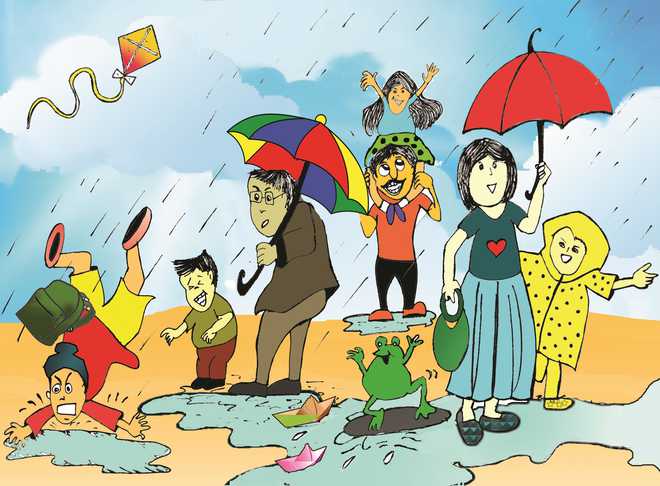http://www.tribuneindia.com/news/life-style/o-monsoon-come-soon/434524.html
By Kuldip Dhiman. Illustration by Vishu Verma
It is monsoon time, it is fun time, it is romantic time. It is a time to chat with friends and eat really chatt-patti spicy things such as pakore, malpude, kachori, and not to forget steaming hot jalebis. Outdoors, it is a great sight to see people running for cover, some tripping over wet earth and having a great fall, others watching and laughing, a car passing by and splashing water all over you.
The fascination with the rains is due to the fact that water is the source of all life. That is why this season is a time for procreation not only among humans but nearly all creatures. No wonder it has a strong association with romance.
Traditionally called Sawan- Badhon, the two months of rainy season mean different things to different people. For children it is a time to make paper boats and swim in the muddy pools. This was well expressed by the poet Sudarshan Fakir when he reminisced: Wo kagaz ki kashti wo barish ka pani. To the farmer, good rains mean good crop; to cricket aficionados, rain on the day of the match means disappointment; and to the lovebirds, it is the season for physical closeness as Zeenat Aman urges her lover to leave his job and come back: "Teri do takeyan di naukari, mere lakhon ka Sawan jaye re ...." (For your two-penny worth job's sake, my priceless rainy season is going wasted.)
Coming to the classics, Kalidasa gave a vivid picture of the rainy season in Meghadootam and Ritusamharam. Urdu poets have written profusely on the wet season, often with a tinge of irony. Making fun of his dilapidated home, a poet wrote: Mere ghar ki muflisi ko dekh kar badnaseebi sar patak ke rah gayi, Aur ek din ki muktsar bearish ke baad chatt kayin din tak tapakti rah gayi. (By looking at the dilapidated condition of my home, even misfortune was moved to tears; Because after only a day's brief rain, the roof kept leaking for days).
The poet Gopaldas Neeraj also wrote tongue in cheek: Abke Sawan me shararat ye mere saath hui, Mera ghar chhod ke kul shahar me barsaat hui. (This rainy season played mischief upon me; Leaving my home aside, it poured all over the town.)
Hindi films often have a rain song whether the story demands it or not. This is because it gives a good excuse to show the curves of the heroine. For decades rain songs such as Barsat mein hum se mile tum, (Barsat 1949), Zindagi Bhar nahin bhoolegi ye barsat ki raat (Barsat ki Rat 1960), Sawan ka Mahina pawan kare shore (Milan,1967), Rim jhim gire sawan (Manzil,1979), Tip tip barsa paani (Mohra,1994); Sanson ko sanson mein (Hum Tum, 2004) and Yeh saazish hai boondon Ki (Fanaa, 2006) have been a raging success with the audience.
Closer home, Hans Raj Hans sang his popular Saun mahina kin min kin min and Babbu Maan came up with Saun di jhari, evoking the romance of the rains. Not to forget Chaman Lal Chaman's Saun da mahina yaaro sung by Jagjit Singh.
Rains also mean fun and jokes. My maternal grandfather used to sing this funny limerick long before Hinglish and Pinglish came into vogue. The scene is of a little boy who is walking to his school but is stuck on the way because it is raining: "O! My master how I come; Godey-godey paani te mee chamacham'; Ik pair fisaleya te ho jaye ghadam; Upar my basta te heth I am." (O my teacher, how should I reach school. The water is knee-deep as it is pouring, and I might slip and have a fall with schoolbag above me and me beneath it.)
Not too long ago, children just ran out and got wet in the downpour least bothering about their clothes or belongings, but in this age of comfort, most of us have forgotten the sheer joy of getting wet in the rain. It is time to be a child again, it is time to give up all inhibitions and get wet and have fun.

No comments:
Post a Comment